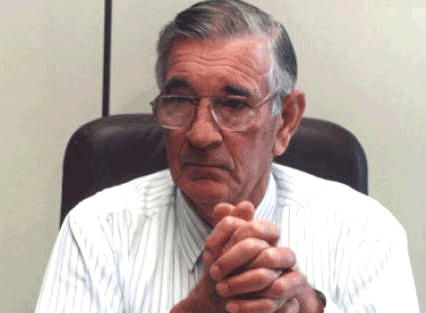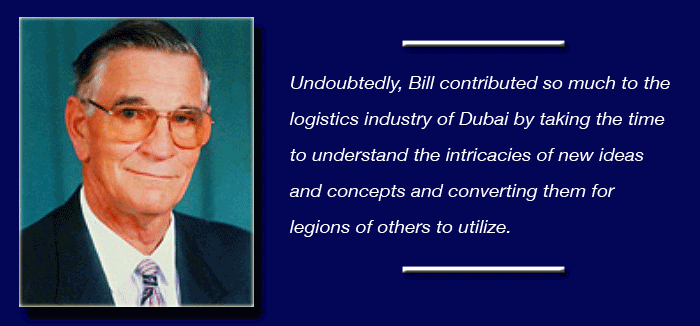| 
The
notice was brief:
“Bill Duff, who served as Shaikh
Rashid Bin Saeed Al Maktoum’s trusted financial expert during
the early development of the emirate, passed away on Friday February
14, 2014, at his residence in Jumeirah .
He was 92.
Duff died of natural causes at 4:30
pm on Friday.
He is survived by his wife, Irenka,
two daughters, Diana and Sheila, and four grandchildren.”
Here, friend and colleague Issa
Baluch remembers William (Bill) R. Duff:
 The
news about the death of Bill Duff on February 14 may be considered
another chapter in the passing parade by many. The
news about the death of Bill Duff on February 14 may be considered
another chapter in the passing parade by many.
In Dubai and elsewhere, to succeeding
generations of those who have heard of him, Bill Duff may be recalled
as just one of those expatriates who did his job for a salary and
in the process, helped build Dubai under the former Ruler Sheikh Rashid
Bin Saeed Al Maktoum.
I hope this remembrance will personalize
the many news articles about Bill recently, as well as recognize the
integrity and magnitude of his work.
Of the 52 years that Bill lived in Dubai,
I knew him for about 40.
My interaction with him started in the
1970s.
Bill had unique responsibilities—one
of which was being responsible for refugees in the Ruler’s office.
But that’s a whole other story
that maybe we will address here at some other time.
Today, we can recall some experiences
with Bill that made him my role model and hero in so many respects.
| Via
Dubai Had Humble Beginnings |
I met Bill
when he served as Inspector General of the Dubai Ports and Customs.
At the time I was looking for permission
to get special dispensation to move exhibition goods in transit from
the sea port of Dubai (Port Rashid) to Dubai International Airport
for air-freighting to Cairo and Tripoli on chartered B707F owned and
operated by IAS of UK.
The goods, approximately 60 tons, were
shipped from Australia by NYK lines and due to the delay on the voyage
en-route, could not make it to Egypt and Libya for the scheduled exhibition.
Together, we concluded that if the goods
were redirected to their destination via Dubai, they would be able
to make the transit connection and air charter, which in turn would
allow us to meet the exhibition schedule.
Bill
understood clearly the dilemma we were in and got us a special dispensation
in two days from the Ruler of Dubai allowing us carry out the transaction,
which we did very successfully.
Some months later, I came to learn of
the congestion experienced throughout Indian airports and how difficult
it was to move air cargo from India to Europe.
The normal layover of cargo after booking
with an airline was about seven days, with goods sitting out in the
open area or in warehouses at the airports.
The time lapse of airlifting goods to
destinations in Europe was about 10 days in all.
Once again, I approached Bill, who was
immediately receptive and encouraging.
Bill asked me to describe my ideas in
writing.
My
report basically created a timeline showing sea freight from Indian
ports to Dubai (5 days) then the transfer and airlifting the shipments
via Dubai to final European destinations, and then using the return
empty leg of passenger and freighter capacity from Dubai (2 days).
The key in making such a combined multi-modal
concept work was Dubai Customs waiving import duty of four percent
assessed on CIF value.
The Dubai Customs ordinance in those
days was quite clear.
Any goods that move by sea from Port
Rashid were duty exempt.
By road from Port Rashid, there was
a need for payment of an import duty.
The ordinance did not distinguish whether
ultimately the goods would be air-lifted from Dubai, so there was
no need for a duty imposition.
The real challenge to this new scheme
was that this all took place during an era before the customs seal
had become such an important controlling tool for security, and containerization
was still in its infancy stage.
 |
Bill
was able to process the change in the Customs ordinance allowing us
to transfer ocean freight to the airport without payment of customs
duty.
Subsequently, the Ruler of Dubai issued
a Royal decree to this effect and we were off to the races.
Our
first commercial sea/air shipment was Indian manufactured garlic presses
destined for London on Gulf Air.
That year, 1978, we handled about 170
tons; the following year, it jumped to 2,000 tons and progressively,
we reached levels of 45,000 to 60,000 tons.
| First
Container Station In Dubai |
The
very first container freight station (CFS) at Port Rashid was established
under a special dispensation organized by Bill Duff, allowing us to
move aircraft pallets and palletize the goods at Port Rashid.
This development then largely led the
way to establishing more free zone concepts on distribution of freight
from the Emirate of Dubai.
| Working
Man of The People |
Once,
after a long day at work, I commented on the overwhelmingly large
numbers of merchants, traders, or logistics service providers he must
be accommodating in a day, and his response surprised me:
“I actually don’t see enough,”
Bill laughed.
To Bill, his duty as a customs officer
was to keep his doors open to as many people as he could possibly
serve in order to keep the trade in Dubai moving and without interruption.
Bill’s work ethic was the backbone
of Dubai customs policies in those days.
All of us who worked with him and followed
in his footsteps admired and wanted to be like Bill.
Undoubtedly, Bill contributed so much
to the logistics industry of Dubai by taking the time to understand
the intricacies of new ideas and concepts and converting them for
legions of others to utilize.
Bill
Duff came to grips with the challenges of sea-air combined transport
and focused instead on what it would mean to Dubai.
He grabbed the opportunity to provide
solutions and realign policies in order to place the Emirate firmly
on the map, making it a preferred gateway point to traders worldwide.
Bill was instrumental in doing all that—and
he never claimed credit nor glory for himself.
I know for a fact my success in Dubai
was because of such business-minded government officials like Bill,
who worked closely with the late Ruler who cared enough to help formulate
the future of the industry at that time.
I do not claim to know everything about
Bill.
In fact, now that details about his
life are being published, I am amazed to realize how little I know
of the man I have considered as closely as family.
But one thing is for sure—no matter
how small a portion I may have known about Bill’s personal life,
I will always consider him a big part of mine.
| Always
The Great Bill Duff |
Bill’s
passing is indeed a great loss to the industry.
I hope that when you read or hear about
Bill, you will think of these short stories that I had the liberty
to share with all of you, and envision the many wonderful developments
he contributed to Dubai and to the logistics industry in general.
Since I am teaching in Boston now and
was not able to be in Dubai to pay my respects to Bill and his family,
I asked my daughter Sarah to attend services and extend our heartfelt
condolences and good wishes.
Sarah described the outpouring of love
and respect for Bill as “amazing, including scores of friends
from all over the world, with well wishers and people from many races
and creeds who thought of Bill Duff as a friend.”
When folks at the services wondered
and asked Sarah who she was, my daughter said simply:
 “Mr. Duff was the role model for
my Dad.”
“Mr. Duff was the role model for
my Dad.”
Most understood those words, replying
that in various ways, Bill was their inspiration as well.
Something Bill’s daughter said
sticks in my mind right now:
“He dedicated his life to working
with the Arabs—he treated Arabs as if they were his family.”
I believe this with all my heart; Bill
indeed made me feel like his own son.
Issa S. Baluch
Boston, Feb 20th 2014 |





 The
news about the death of Bill Duff on February 14 may be considered
another chapter in the passing parade by many.
The
news about the death of Bill Duff on February 14 may be considered
another chapter in the passing parade by many.
 “Mr. Duff was the role model for
my Dad.”
“Mr. Duff was the role model for
my Dad.”